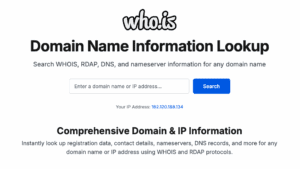Domain Due Diligence – What to Do Before You Buy
Before getting excited about the domain name you want being available, ask yourself why it is up for grabs – especially if it appears to be a great name. Many domain names on the open market have a hidden past – as NameExperts.com Director Joe Uddeme explains… Let’s say you just found out you can secure a domain name that matches the name of your new business. Or maybe you’re doing it the other way around and want to start with an available domain name that you’ll build your business around. Now let’s suppose it’s one of those short, snappy modern domain names made up of five letters that don’t mean anything. Now press pause. Before you plan the entire history of your brand around these five letters, it’s advisable to perform some due diligence – just as it is when buying any domain name. When buying a car, it’s helpful to have a trusted mechanic perform an inspection and to review the vehicle’s service history before handing over your cash. A similar thing applies to purchasing domain names. It’s necessary to perform proper due diligence – or you risk wasting money. This article will give you a due diligence checklist to follow to ensure you make a worthy purchase and ensure you don’t buy a domain name with a damaging hidden past. Key Takeaways Spammy “past lives” of your domain name could damage your reputation Discover the tools that help you discover your name’s true past Make sure there are no trademark issues Why You Need To Conduct Due Diligence For Any Potential Acquisition Due diligence means investigating the details of a business or person that you want to enter a commercial transaction with. It’s necessary because it helps you understand the nature of what you want to buy, the risks involved, and anything else that could be a hindrance. Not conducting domain name due diligence before buying can cause trouble. For example, you may buy a domain that has been blacklisted for spam activities and wonder why your website isn’t getting traffic. Or why any email sent from your domain goes to the recipient’s spam folder. You could also buy a stolen domain and be subject to lawsuits accusing you of theft – or one that used to be an adult site. The list of potential risks is endless, so always carry out domain due diligence before any purchase. Domain Due Diligence Checklist WHOIS WHOIS is a public database containing information about domain name owners. You can run a WHOIS lookup to trace the ownership of a domain name, and it’s advisable to do this for any domain you want to buy a domain name. Check the WHOIS history for at least a year to see if there were any ownership changes. If you notice any, you can contact the prior owner to ensure that they actually transferred the ownership and the domain wasn’t stolen. Domain thieves try to sell domains in a hurry, and this process helps you avoid buying a stolen domain and exposing yourself to legal troubles. Because of Europe’s GDPR data protection laws, you may not be able to see details about a domain’s owner (it’ll appear as redacted). However, access is granted to certain licensed third parties that, in turn, offer that data to people for a fee. DomainIQ and DomainTools are two examples of such parties. Domain History The WHOIS lookup will help you verify that the domain is owned by a legitimate buyer and not a hacker. After that, the next step of the domain name due diligence is to check how the domain was utilized in the past. What type of website was it used for? Is it something that could have gotten it into a blacklist? A good website to check a domain’s history and utilization is the Wayback Machine. This is a digital archive that lets you see how the website for any domain looked in the past. The idea is to ensure that the domain was used for appropriate activities. If it was used for nefarious things like unregulated gambling, domain name scams, or data theft, it’s a signal to stay clear because the domain may have been blacklisted by search engines and email providers. Potential Trademark Issues Ensure that the domain name you want to use is not similar to an established trademark because this can lead to infringement lawsuits and a possible court order to hand over the domain. There was a popular case of an entrepreneur called Mike Rowe, who registered the “MikeRoweSoft.com” domain for his software company. Microsoft, the well-known software company, filed a lawsuit alleging trademark infringement, and Mike Rowe had to hand over ownership of the domain in exchange for an Xbox and some certification training. If the domain name you want to buy is similar to an established trademark, it’s best to avoid it and go for something else. Search Value Another important part of the due diligence checklist is to see how the domain name performs on search engines. If you can’t find valid results when you input the domain name of a search engine, it’s a signal that it may have been blacklisted due to past activity. Check if there are backlinks from nefarious sites pointing to the domain because that represents another red flag. It’s also important to see if a domain has been marked by email blacklists. If so, emails from that domain will likely end up in the recipient’s spam folder instead of the main inbox. Popular email blacklists include Spamhaus, Barracuda, and Proofpoint, and most of them let you run a simple scan to see if a domain is part of the list. During the Acquisition Process Once you have ticked all the boxes in your acquisition due diligence checklist and decided to proceed with the purchase, there are some essential tips to follow. Tracking Each Step You should create a spreadsheet to track each step of the domain name sale. The spreadsheet should contain sections like “current status”, “date transferred”, and “price”. This will help you stay on top of every detail of the imminent domain acquisition. Setting Up Escrow Escrow refers to a neutral third party that holds the money before it is transferred from the domain buyer to the seller. It’s necessary to use an escrow service to prevent yourself from falling victim to fraud. The escrow service will hold the money that you’ve agreed to pay for the domain and only disburse it if the seller fulfills all the terms of the deal. What To Keep In Mind For the Transfer Process When you acquire a domain, the buyer will have to transfer it to your registrar for it to officially become yours. A domain must be at least 60 days old to be transferable according to rules defined by ICANN, the governing body for domain registration. The owner will need an authorization code from their registrar to authorize the transfer to your own registrar. Once this is complete, the domain is officially yours. If you need help with domain name due diligence, you can hire a professional domain broker with experience in appraising and investigating domain names. The broker can help you decide if it’s a worthwhile purchase and also negotiate a good price with the owner. Check out our post on domain name negotiation tips for further insight into this exciting and complex world! About the author Joe Uddeme is Director and Principal of Name Experts, one of the world’s leading domain name brokerage services. He has overseen domain name sales and acquisitions totaling more than $150 million and is renowned worldwide as a go-to expert in buying and selling premium domains. Contact us at: [email protected]








